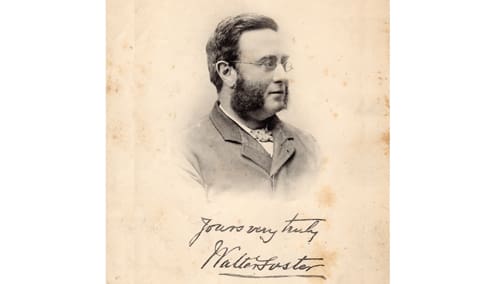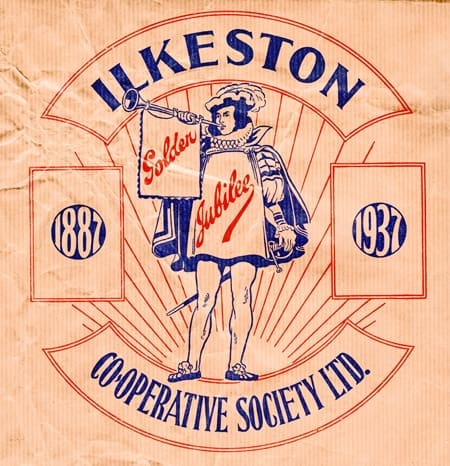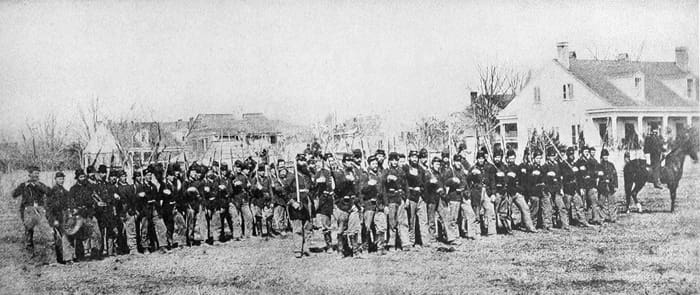Sir Balthazar Walter Foster PC FRCP was born to Balthazar Foster and his wife Marian on 17th July 1840. In 1847 the family moved to Foster Senior’s native Ireland, and Foster was educated at Drogheda Grammar School. In 1857 he attended Trinity College, Dublin, where he studied medicine. After graduation, he joined the Royal College of Surgeons in Ireland as a ‘prosector’ of Anatomy [someone who prepares bodies for dissection], and in 1860 he qualified for practice as a Doctor in his own right. Foster was appointed Demonstrator in Practical Anatomy at Queen’s College, Birmingham (a predecessor college of Birmingham University), later being appointed Professor of Anatomy. In 1864 he obtained his MD from the University of Erlangen-Nuremberg, in Germany and in the same year married Emily Martha Sargant of Edgbaston.
On the merger of Queen’s and Sydenham colleges in 1868 he was appointed Professor of Medicine, a position he held until 1892. He became a doctor at Birmingham General Hospital, and as a teacher and clinician he wrote many books and academic papers. In 1870 he published ‘Method and Medicine’, a defence of scientific research in medicine. This was his last major piece of academic medical work; in the 1870s he became involved with public health and the social applications of medicine. In 1873 he was elected a Fellow of the Royal College of Physicians (FRCP).
Foster had shown an interest in public and medical politics from 1866 onwards and was elected as a City Councillor in Birmingham in 1883. Later that decade he was elected to the General Medical Council and served for ten years.
In 1885 he was elected as a Member of Parliament for Chester as a Liberal candidate with a programme of free education and improved housing for the poor. Although an ardent supporter of Joseph Chamberlain, Foster did not reject Irish home rule in 1886 as Chamberlain did. In 1886 he was made President of the National Liberal Federation, where he tried to keep Chamberlain’s supporters loyal to Prime Minister William Gladstone. Foster lost his Chester seat in the Liberal defeat in the 1886 election, and a knighthood the same year suggested that this might be the end of his political career.

At this time politics was particularly muddy, with Unionists, Liberal Unionists and Liberals contesting elections as a result of Gladstone’s controversial plans for Irish Home Rule. Foster was offered the nomination for the Liberals at a by-election held in the Ilkeston Division on 24th March 1887 following the death of Thomas Watson, the sitting Liberal MP. Fortunately for Foster, in Ilkeston there was a straight fight between Liberal and Conservative, the other candidate being a Samuel Leeke. Although his successful conservative opponent from Chester Robert Yerburgh MP followed him and did his best to discourage locals from giving support, Foster was returned to Westminster as Ilkeston’s MP with a majority of 1,332, a swing to him of 2%.
Foster’s main interest in parliament was medical issues, speaking in support of the medical officers in the Army and on other public health concerns. In 1892-95 he served as Parliamentary Secretary to the Local Government Board, becoming the first doctor to hold a ministerial post in Britain. He organised the sanitation campaign between 1892 and 1895, which successfully prevented the 1893 Cholera epidemic reaching Britain and Chaired the Select Committee on Death Certification.
On 24th August 1904 Sir Walter Foster was granted the Freedom of the Borough of Ilkeston along with the Duke of Rutland (Lord of the Manor) and Andrew Carnegie, the philanthropist and industrial magnate at the opening of the Ilkeston Library (which Carnegie had paid for at a price of £7,500). All three – although Foster was the only one actually present – were presented with a certificate and a handsome silver casket bearing the Borough Arms and several enamel scenes.
When the Liberals returned to power in 1905 some had predicted a cabinet position for him, but he was passed over on grounds of his age. In 1906 he was made a member of the Privy Council. After his sixth victory at Ilkeston in 1910 he was asked to vacate his seat to allow J. E. B. Seely, the former Secretary for War who had been recently defeated in his own constituency, to take his place. Foster resigned from the House of Commons, and Colonel Seely was duly elected as MP for Ilkeston in March 1910.
Later that year, Sir Walter Foster was elevated to the peerage and took the title ‘Baron Ilkeston of Ilkeston in the County of Derby’, which came in those days with an automatic seat in the House of Lords. Unfortunately, his growing ill health meant that he was unable to achieve much during his brief membership of that house. A bowel obstruction was successfully operated on in 1911, but Foster died of bowel cancer on 31st January 1913 at the age of 72.
The title ‘Baron Ilkeston’ passed to his youngest and only surviving son, Balthazar Stephen Sargant Foster, 2nd Baron Ilkeston and became extinct on his death in 1952. The Ilkeston Council’s silver casket, presented along with the Freedom of the Borough to Walter Foster in 1904 was happily retrieved by the Council after his death and is now in the Erewash Museum Collection.



